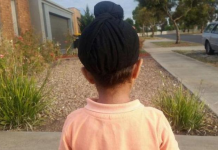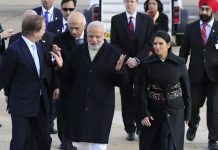

 It is unusual to see a candidate pursue for ten yards down the pavement a middle-aged man who shows no sign of wishing to talk to him. But Amandeep Singh Bhogal (seen here explaining a point to ConHome) is in some ways a rather unusual candidate.
It is unusual to see a candidate pursue for ten yards down the pavement a middle-aged man who shows no sign of wishing to talk to him. But Amandeep Singh Bhogal (seen here explaining a point to ConHome) is in some ways a rather unusual candidate.
Bhogal, a Sikh born in India and brought up in a council house in Bexley in Kent, is standing as a Conservative in the constituency of Upper Bann, in the middle of Northern Ireland. Yesterday afternoon I watched him, resplendent in blue turban and blue suit, with a blue rosette bearing the words “BACK BHOGAL”, as he canvassed voters in the main street of Banbridge, one of the seat’s principal towns.
The man who was trying to shun Bhogal at length relented and engaged him in conversation. The first words I heard this voter say were: “The whole system here is crap but it’s never going to change.”
Bhogal smiled and replied in an ebullient tone: “Well you have to make a start somewhere!”
The man also smiled, and said: “I hope you’re supported here, but I don’t see much chance of your getting this seat.”
The candidate admitted that victory might elude him in 2015, but said the foundations could be laid for a Conservative victory in 2020: “We have a long-term electoral plan!”
The man complained that “the three political offices up there” – he waved up the hill – “are all being paid for by us, and yet they’re getting rid of civil servants.” Like many voters in Northern Ireland, this man is fed up with the province’s politicians and reckons they are enriching themselves at public expense.
Bhogal explained that the Conservatives want to “end sectarian politics” in Northern Ireland and introduce “some real normal politics”, with arguments about the economy, and voters presented with the choice between David Cameron and Ed Miliband. He believes that sectarian differences, from which politicians make their careers, mean less and less to young people. He is in favour of “extremely low taxes”, and believes the state sector – still 72 per cent of Northern Ireland’s economy – needs to be reduced.
The voter’s last words were: “You know what, I agree with everything you say, and you haven’t got a chance.”
Upper Bann is currently held by David Simpson, of the Democratic Unionist Party, who in 2005 captured it from David Trimble, the leader of the Ulster Unionist Party. Bhogal’s candidacy is beginning to attract the interest of the press, for he is a vivid and unexpected figure, but no one expects him to win.
Untainted by anything so sordid as the expectation of immediate power, he is able to enjoy challenging the assumption that nothing can be done. One woman told him he is “a breath of fresh air”, while another said with a smile, “You’re an unusual candidate”.
But a third woman said “No” to him before he had even passed her a leaflet, and proceeded to say “No” to everything he said.
Bhogal: “Have you ever voted?”
Woman: “No.”
Bhogal (quite enjoying being scandalised): “You must!”
Woman: “No.”
I asked Bhogal how he remained so cheerful in the face of such discouragement. He said he had learned from Boris Johnson, whom he got to know while himself standing for election to the London Assembly, “never to give up”, and to “make sure you go and get those socialist voters on your side, because at the end of the day they should understand you’re working for them as much as anyone else. You have to go get them. You have to give it that extra oomph.”
Bhogal, who is 31, was adopted only 16 days ago as candidate in Upper Bann, which is perhaps one reason why he seems so chirpy. But his refusal to take “No” for an answer has deeper roots than that: he put in for no fewer than 45 parliamentary seats before this one, only one of which, Kingston and Surbiton, invited him for interview. On hearing that he had tried and failed to become the Conservative candidate in South Thanet, UKIP made four unsuccessful attempts to recruit him.
Before his astonishingly persistent attempts to find a seat, he had to survive being transplanted at the age of eight from Punjab to Bexley, where he entered primary school able to speak only two words of English, “pardon” and “thank you”. At the age of 21 he got married, and he and his wife have two children. At their wedding in Punjab, there were 2,000 guests, which he says is quite normal for India: “You can’t really afford to leave people out.” He pointed out that not only the bride and groom are getting married, but the two families as well. He calculates that there are 96 members of his extended family in the United Kingdom, about 100 scattered across North America and the Middle East, two in Australia and another two hundred in various parts of India.
In Upper Bann, which is 54 per cent Protestant, half the population go to church on Sunday. Bhogal, who along with his family is a practising Sikh, recently astonished people by attending a church service at which he was able to say the Lord’s Prayer and sing the hymns, which he had learned when he was in the choir at Beths Grammar School in Bexley.
Joe Nelson, a local SDLP councillor, asked with amusement why the Conservatives are putting up candidates in only 16 of the 18 seats in the province: “Why are you not running in North Belfast and why are you not running in Fermanagh and South Tyrone? Is not there a pact? It looks very strange.”
North Belfast is the seat of Nigel Dodds, leader at Westminster of the DUP, with whom the Conservatives might wish to do a deal after the election. In 2010 Sinn Fein won Fermanagh and South Tyrone by a margin of only four votes.
Bhogal has coined a slogan for his campaign: “Together we can in Upper Bann.” He has had tee-shirts printed. And he is fortunate to be able to rely on the help of John Lund, who comes from a long line of textile manufacturers and runs a federation of four Conservative associations including Upper Bann.
Lund was wearing his Old Carthusian tie. For he was one of the small band of Northern Ireland Conservatives who yesterday morning went to meet David Cameron at Belfast City Airport, and it amuses him to remind the Prime Minister that Eton is not the only school.
The visit of David and Samantha Cameron to the studios, next to the airport, where Game of Thrones is made, provided pictures that were widely used: and by visiting Scotland, Northern Ireland, Wales and England, on the same day, the Prime Minister reminded people of his Unionist credentials. He also took the opportunity to be photographed individually with Bhogal and other Conservative parliamentary candidates, and for a few minutes he took questions from the local press.
But such a flying visit is inevitably a cursory affair. Bhogal in Upper Bann can devote rather more time to fostering the affinities and connections which sustain, or ought to sustain, the Union. He says the rolling agricultural land of Upper Bann reminds him of Kent, and the constituency is in many respects naturally Conservative. In conversation with people in Banbridge, he touched as appropriate on his own family’s four generations of farming in Punjab, or his time as an apprentice moulder in the family foundry there.
It would be surprising if the Conservatives achieved a great breakthrough in Northern Ireland at this election. But it is already an achievement to be fielding 16 candidates, among them the irrepressible Bhogal.




[…] http://www.sikh24.com/2015/04/12/amandeep-singh-bhogal-the-sikh-conservative-who-wants-to-end-sectar… […]